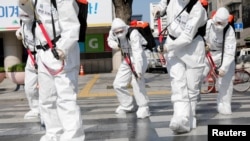On December 24, local authorities in Daegu, South Korea, adopted the slogan "Colorful Daegu" to capture the city's "diversity, inclusiveness, vivacity, passion, and energy of progress."
Less than two months later, Daegu is at the center of South Korea's coronavirus outbreak. The largest outside China, the nation has 5,186 confirmed cases and 31 deaths as of Tuesday. Daegu is largely shut down with the mayor asking residents to remain indoors, a request that turned the bustling city into an eerily empty urban center permeated by fear.
"It's really noticeable that there are fewer people around," said Na Yo-seop, a Daegu resident who spoke to VOA Korean at Cheongna Hill Station. "For example, when I got on [the train], I could barely count five people. I also see fewer cars but in a way, I'm happier to see few cars out."
Most people are inside because "everyone is nervous and scared," said Nguyen Dang Cu, 28, a graduate business student from Vietnam at Keimyung University, one of more than a dozen colleges and universities that draw students from throughout the region and beyond, much as the city's factories draw migrant workers. At Daegu University alone, there are about 500 international students from 29 countries.
"My parents in Ha Trinh wanted me to return home, but I said I'm fine here," Cu told VOA Vietnamese. "I think going back to Vietnam is not necessarily a good plan at the moment because I am at the center of the epidemic. That means I may spread the virus to my family ... back home."
Thai Thi Ngoc Bich, a Vietnamese woman who is married to a South Korean man, has lived in Daegu for nine years. She works for the city's multicultural center and lives "not too far" from the Shincheonji Church that is at the center of the coronavirus outbreak in South Korea.
She opted to remain in Daegu despite calls from her mother and siblings urging her to return home to Can Tho.
"I feel safe here because I trust South Korea's medical service," she told VOA Vietnamese.
Several thousand Cambodians work in Daegu's factories. Tim Vanny told VOA Khmer by phone last week that he and five Cambodians working in a steel factory trust the health measures put in place by the authorities to contain the spread of COVID-19.
"There is water for washing hands and antibacterial spray around the factory," said Tim Vanny, who is from Kampng Spea province. Authorities have issued guidelines for taking preventative measure outside work "and send text message by phone to us almost every hour urging us to follow their preventative measures."
Yim Sinorm, president of the Cambodia National Rescue Movement in South Korea, told VOA Khmer: "Generally, there is no indication that they want to leave Korea to go back to Cambodia because they think that if Cambodia suffers an outbreak, the Korean government would shut down flights from there, and they would lose their jobs and benefits."
Some 50,000 Cambodians work in factories, food production and agriculture throughout South Korea.
Kim Mary from Cambodia's eastern Tbong Khmum province has been married to a South Korean for more than 10 years. She told VOA Khmer,"I feel safe here ... because there are many ways to protect us" despite the rapid spread of COVID-19 in South Korea. However, Kim Mary has not been outside her home for more than a week.
That lifestyle change is "stifling," said Kim Ki-dong, 70, a resident of Daegu's Dong-gu neighborhood. "We have errands to do, like going to the bank. We're used to traveling back and forth freely but because we can't go outside, it's very inconvenient."
Elvira Fidelia Tanjung is an Indonesian who earned her Ph.D. in mechanical engineering at Daegu's Kyungpook National University. She remained there for post-doctoral research. She told VOA Indonesia the government has "urged all places of worship" to restrict gatherings. "Local churches are doing online services through Facebook or webinar. The Korean Muslim Federation has also urged Muslims to … stop doing congregational prayer or any other activities."
Hla Yamin Eain, a Burmese actor who works in Daegu's television production sector, told VOA Burmese that many local restaurants, "popular places, usually with lots of people, are deserted. All the streets are only used by food delivery people because people are staying indoors and ordering food to eat at home. … Right now, we still have food to eat, and the restaurants are still there," she said. "I don't think we will need to worry about food supply even if the government shuts down the city."
For people like Kim Bong-son, 60, who lives in Daegu's Buk-gu neighborhood, deliveries of food and other daily necessities are troubling. "We're even afraid to receive them," she told VOA Korean. "We go out to get them wearing a mask a while after they're delivered. We don't take the boxes inside. We open the boxes with scissors outside and bring the products in. It's very scary."
Kim Hyung-jin of VOA Korean reported from Daegu, South Korea. An Hai and Khánh An of VOA Vietnamese, Kimseng Men of VOA Khmer, Dhania Iman of VOA Indonesian, Yan Wynn of VOA Burmese and Christy Lee of VOA Korean contributed to this report from Washington. It originated with VOA Korea.




